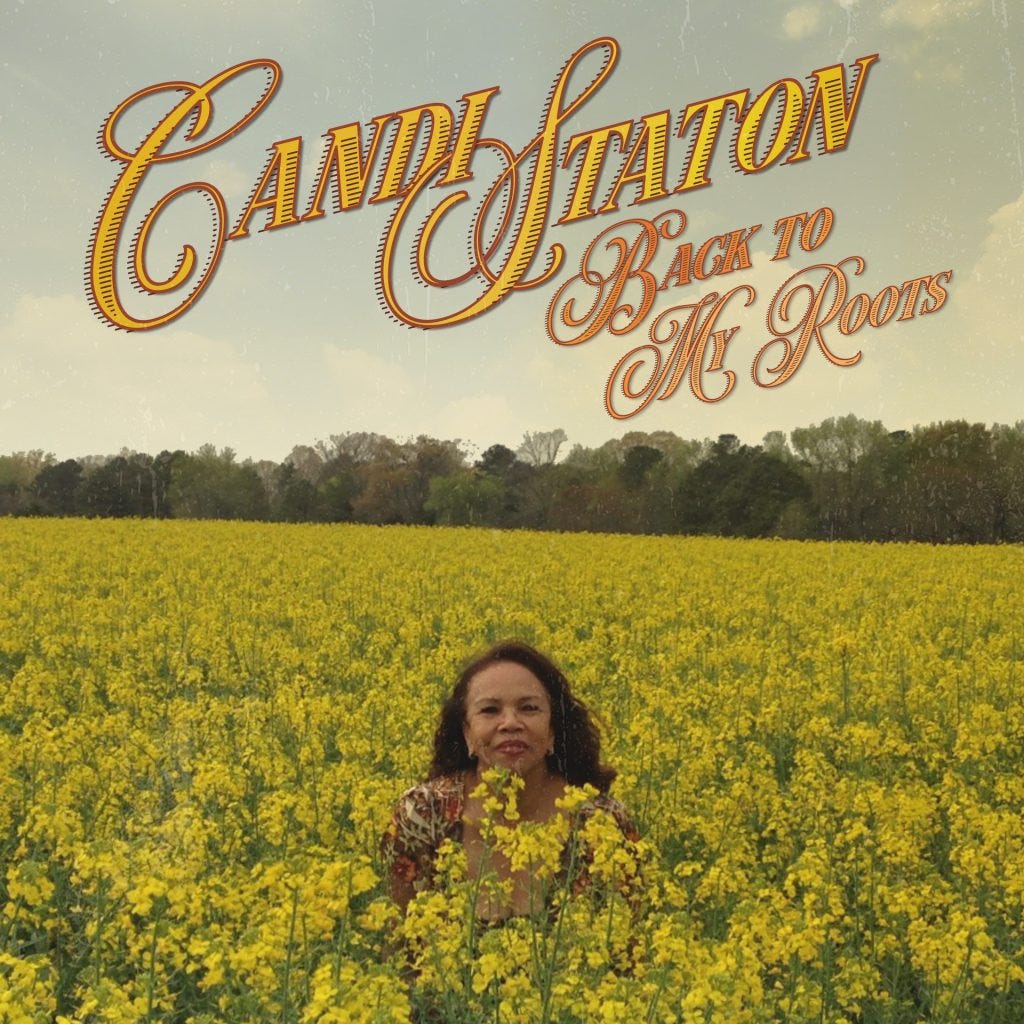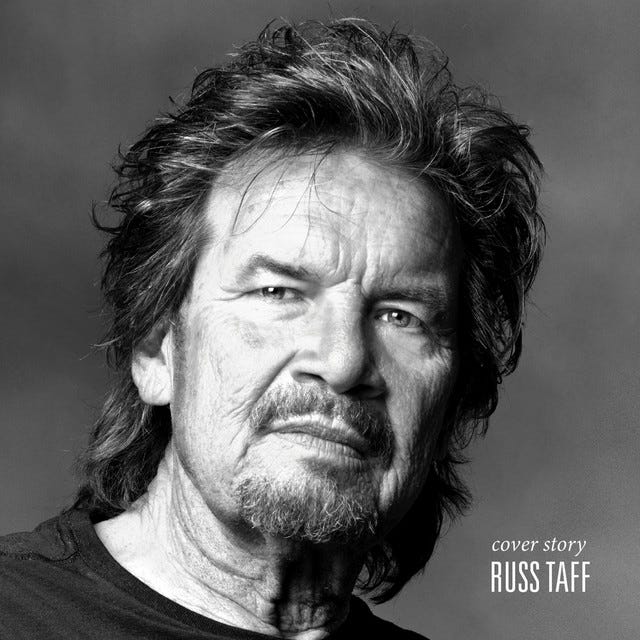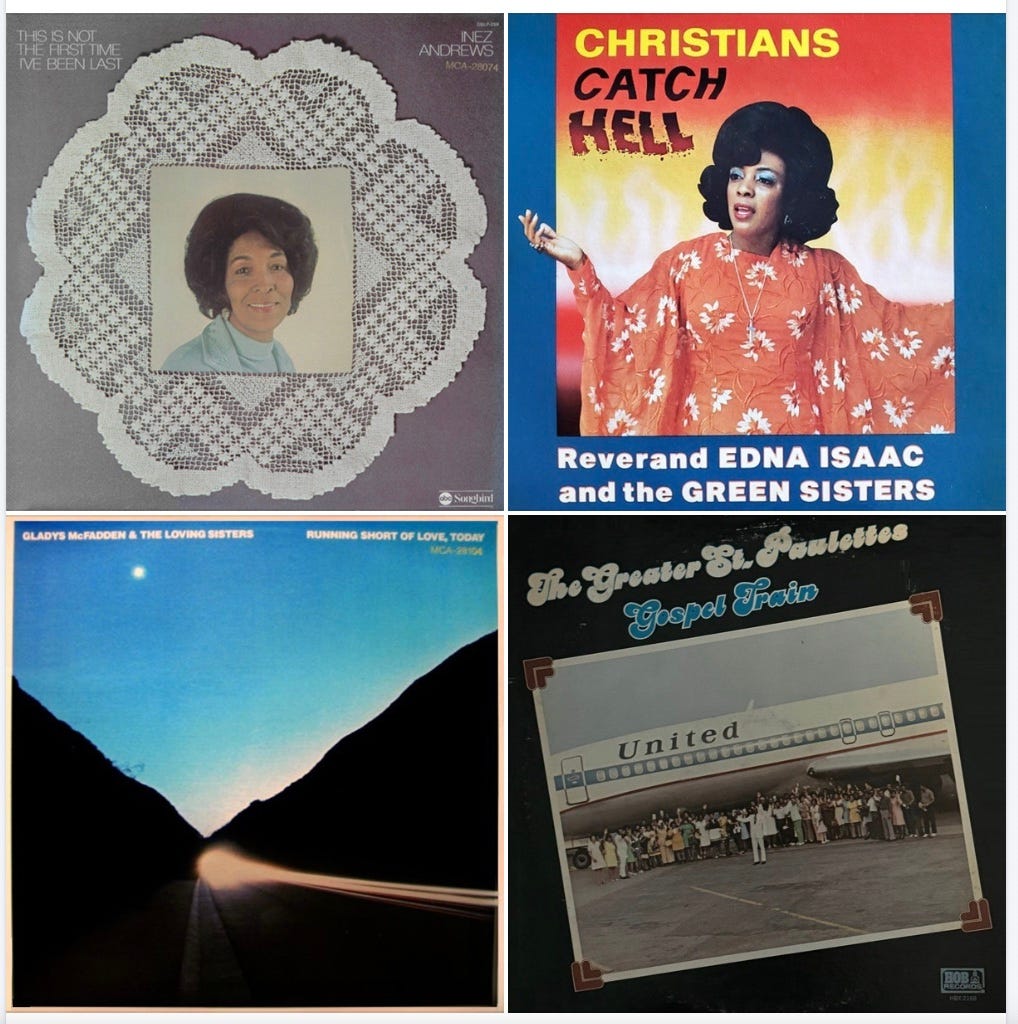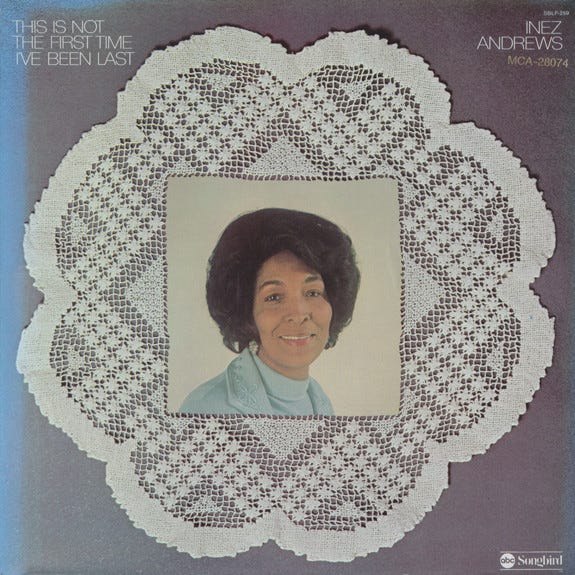Cover Stories: Russ Taff & Candi Staton
Two of gospel music's greatest singer-songwriters tell their stories through (largely) the songs of others in two of the best new releases of 2025 thus far.
Two of the most consistent voices throughout my life have been Candi Staton and Russ Taff, both of whom I first heard as a child of the church growing up in the 1980s. Their degrees of success within the machinery of the Christian music industry are a study in extremes—but what they share are similar musical journeys as purveyors of American music and a theological and humanistic commonality. They’ve chronicled their struggles and emotional pain (both have dealt with addiction), the comfort and strength they drew from their faith, and their concerns and dreams for humanity. They held unique positions within the evangelical world as renegades who found themselves accused of being “too much” or “not enough” of one thing or another at various points, but their brand new releases reflect a kind of self-acceptance and clarity of mission that only time and introspection can bring. They aren’t trying to convince anyone of anything, they’re saying ‘This is who I am. This is what I have. Take it or leave it.’
When Candi Staton returned to Christian music at the beginning of 1983, she came wearing the caché and stigma of a successful solo career in secular music. She had begun her career as a youngster on the gospel circuit with the Jewel Gospel Trio in the 1950s, a group that recorded for Nashville’s Nashboro Records and employed instruments deemed worldly (like a steel-guitar, bass and drums) by traditionalists. She was a witness to her friend Sam Cooke’s crossover, a teenaged Aretha Franklin’s early years as a gospel prodigy and a handful of future R&B singers like Lou Rawls and Bobby Womack in the gospel quartets. The Jewels were forerunners of a convergent sound that proudly wore the influence of gospel, blues and country.
Staton married a pastor and raised her children in the early sixties, but came back to music in 1969 on Fame Records, reinvented as a siren of southern soul. Her cover of Tammy Wynette’s “Stand By Your Man” earned her first Grammy nomination in 1970 and a subsequent cover of “In The Ghetto,” a Mac Davis composition popularized by Elvis Presley, garnered her second nomination from The Recording Academy. Even when she moved into disco territory with the Dave Crawford-produced “Young Hearts Run Free,” a #1 R&B hit and Top 20 pop hit, she never stopped incorporating her unique brand of country-infused soul with tunes like “Before the Next Teardrop Falls,” “One More Chance on Love,” “So Blue,” and “If You Feel the Need.” She told reporter Phil Gould in 1999, “The country side of me came from when I was a child. There were only two stations I could pick up on my old battery radio—the gospel and blues station and the country station which broadcast all day.”
It was on the heels of the commercial fall of disco that Staton returned to spiritual music at a time when many of her contemporaries like Al Green, Maria Muldaur, Bonnie Bramlett and Deniece Williams were beginning to make faith-based music. Despite her own strong songwriting, commercially competitive production and a sound that bridged contemporary gospel and CCM, the industry’s racial politics excluded her from gaining access to the major Christian labels and radio outlets. In our first interview in 1990, she recalled her first meeting with a Christian label in 1983, “[The executive] said ‘I’m sorry, we can’t use this.’ I was sitting on a stool with my head down, but I could feel my spirit just go up. I looked the man in his face and began to tell him about God. I said, ‘Look! You don’t have to put this record out. I know this record will come out!’”
1983’s Make Me An Instrument and 1986’s Sing a Song earned Grammy nominations and Staton found her audience not through the Christian music industry but through Christian television. She was championed by Jim and Tammy Bakker’s PTL Club (PTL Enterprises was the first to distribute Make Me an Instrument to Christian bookstores) and Paul and Jan Crouch’s Trinity Broadcasting Network where she would host her own show for two decades.
While Staton exclusively committed herself to Christian music from 1984 to 1989, she had an unexpected hit in the United Kingdom in 1986 with “You Got the Love,” a song she’d recorded for a Dick Gregory-produced documentary that was subsequently remixed by Frankie Knuckles. After years of declining offers to return to mainstream music, she reconsidered in 1999 and made her first general market album since 1982, Outside In, for the British label React. Despite its focus on the dance music market, Staton’s predilection for more organic sounds shone on the album’s ballads like “Love Yourself” and “You’re Still the Lightning.”
Outside In opened up a space in which Staton could embrace the totality of her career. As she continued to record gospel content, she made a series of other albums, beginning with 2006’s His Hands, that told broader stories of love and life against the backdrop of the country soul that had first catapulted her to the national stage. She saw her return to secular music as part of her ministry, not a deviation from it.
“I believe the church corner is not going to be the church corner as know it now,” she explained to reporter Donna Isbell Walker in 2000. “I believe God’s church is going to be in the theaters or on the corner or in a club somewhere down the street…A lot of young people come to me for advice, and its a shame people go to their graves and never share their experiences or wisdom with anyone…That’s why I write books or whatever, to share what I’ve done and what I’ve learned and maybe it will help someone else.”
Over the last twenty-five years, her role as a sojourner of American music became more evident to audiences that had reduced her to disco diva. On the heels of a Lifetime Achievement Award from the Americana Music Association UK comes Back to My Roots, an album being billed as the last release of her career.
Given Staton’s diverse musical history, an album titled Back to My Roots may have some listeners asking—when did she ever deviate from them? But the reality is that this new release most succinctly tells Staton’s story, conveying the personal and political history she’s witnessed, participated in and, thankfully, survived, delivering a soundtrack of the music that held her through it.
She reaches back to the beginning of gospel music with Thomas Dorsey’s “Peace in the Valley” and “The Lord Will Make a Way Somehow,” and the congregational song “It’s Gonna Rain” (which reunites her with her sister Maggie Peebles from the Jewel Gospel Trio), all of which are highlights from an album of standout tracks. She gospelizes The Rolling Stones’ “Shine a Light” and joins with Stax Records’ legend William Bell to cover Aaron Frazier’s 2017 underground gospel composition “My God Has a Telephone.”
Staton brings a half dozen new compositions of her own to the table. The album’s opener “I Missed the Target Again,” augmented by the expert guitar work of Jonathan DuBose Jr., carries all the magic of her early Fame Records singles. At eighty-four years old, Staton’s voice has aged like fine wine, spilling over with more emotion than it ever has. “Reach Down and Touch Heaven for Me” strips away the instrumentation and gives listeners a chance to hear that voice as she accompanies herself on piano on record for the first time. In a career that has delivered many great moments, “Reach Down” should go down as one of her most intimate performances.
The centerpiece of the album is “1963,” a spoken word piece that places Staton in Birmingham, Alabama when the 16th Street Church bombing occurred. Staton recalls that day with palpable, gripping emotion with the piece serving as a significant historical document, but even more so, a warning from an elder to another generation. “When will this madness ever end? Will we ever be free?,” she cries. “I”m calling for freedom. I’m calling for peace. I’m calling for victory. They’re still killing…and stealing our children one by one.”
The album’s closer, “In God’s Hands We Rest Untroubled,” written by the late Lari White, is the kind of song Staton has embraced over the last two decades of her career, a song that conveys a universialiity among humanity with the Divine. It’s a bittersweet final performance from an artist who is retiring on a high note with this triumphant album that should certainly find itself among the nominees in next year’s Grammy nominations for Best Americana Album.
I interviewed Candi while she was making this album. We discussed her history on the gospel highway of the 1950s, the stigmas around performing secular music, her migration into Christian music once again in the 1980s, her experiences with Christian television and how the backlash from her divorce in the late 90s opened the door for her return to mainstream music.
You can hear that interview here.
LISTEN TO BACK TO MY ROOTS HERE
The same year Candi Staton released her Grammy-nominated solo gospel debut, Russ Taff released his Grammy-winning solo debut, Walls of Glass. He had emerged on the national stage as a member of The Imperials in the late 70s with whom he recorded six albums and won three Grammy Awards. The hits, like “Praise the Lord,” “The Trumpet of Jesus,” “I’m Forgiven,” and “One More Song for You,” weren’t just temporal radio hits—they’ve proven to be timeless classics still sung today.
In addition to being a voice, he and his wife Tori were a dynamic team of songwriters with a distinctive story to tell. Their compositions on The Imperials’ albums, notably “Finish What You Started” and “Eagle Song,” possessed a vulnerability that stood apart from many of their peers in Christian music. When he stepped out of the group and released Walls of Glass, those kinds of intimacies were even more present. Songs like “I Want to Change” and the title track (written by Russ, Tori and the late Raymond Brown) dealt with the personal, while the album’s massive radio hit, “We Will Stand” faced global concerns. Inspired by a story shared by gospel singer Archie Dennis who had been booked at a church and then turned away upon his arrival because the church did not realize he was Black, “We Will Stand” topped Christian radio charts for fifteen weeks and was recorded by a plethora of other artists including Milton Brunson & The Thompson Community Singers, Shirley Caesar, and the Mighty Clouds of Joy.
Russ’ sophomore project Medals put him even more squarely in the commercial apex of the CCM market becoming 1985’s best-selling album by a male artist (Read more about Medals here). In addition to his own radio hits that year, he featured on hits by Leslie Phillips, Lulu Roman, and Mylon LeFevre, speaking to the wide range of music he could wrap his voice around. But 1985 would be the last year his output would be so customized to work within the framework of the Christian music market.
Beginning with 1987’s self-titled release, Taff began the work of settling into his creative core, going back to the musical basics without the bells and whistles of modern production. The black gospel, southern gospel, blues, rock and soul that were the bedrock of his musical life came together to create a new sound that could only, in comparison, be called a departure. What he was doing, like Staton, was unwittingly creating a body of work firmly nestled in Americana.
In a moment when fundamentalist anthems were dominating Christian radio, an irrational response to the disillusionment created by the Jim Bakker and Jimmy Swaggart scandals, Russ’ songs like “Shake,” “Walk Between the Lines,” and “Farther On,” somehow, did well on Christian radio despite how disparate they were from the party line. He told The Tennessean in 1989,
“I feel a real release in the sense that I can write about all the areas of my life where I’m touched. I’m not saying the Bible isn’t true, ‘cause I believe in the Bible, but alot of times formulas don’t always work. It’s not ‘Here’s the problem; Here’s the Bible answer.’ It used to seem that if you sing gospel music, then you only sing about happy times or sad times with always an answer at the end of it. I think we need a real honest approach about what we think and how we feel and what we write and now I feel the liberty to do that.”
1991’s Under Their Influence pulled songs by Brother Joe May, Blind Willie Johnson, The Staple Singers, along with hymns, spirituals and field songs to pay homage to his upbringing. While his contemporaries like Amy Grant, Michael W. Smith and Kathy Troccoli were all scoring pop hits on Billboard’s Hot 100, he pointed his listeners back to the beginnings of recorded American music.
Since then, he’s done whatever he wanted. He made a mainstream country album, a Bing Crosby-inspired Christmas album, participated in Bill Gaither’s Homecoming recordings and joined the Gaither Vocal Band, and a handful of solo albums that celebrated his musical heritage, revealed new compositions and reiterated his core message of redemption and grace.
What could possibly be left to say or do?
Well, this year’s Cover Story answers that question.
While some of his longtime fans have already taken to social media to voice their displeasure over what they see as another departure, others are thrilled to hear this album that proves just how interested and interesting Russ Taff really is. At the helm of his reinvention is Grammy-nominated CCM artist and provocateur Steve Taylor and musician-songwriter-producer John Mark Painter (whose credits include The Indigo Girls, Patty Griffin and DC Talk), which makes for a significant profusion of talent.
Without limiting himself to the gospel songbook, Russ and Company have gathered eleven songs from the pens of other writers that cumulatively reveal the core values that have always been the driving force behind this artist’s work. Tellingly, he opens the album with Blind Willie Johnson’s nearly one hundred-year old “Tear This Building Down,” a song that explores the flesh/spirit tussle, a universal tension. With Pops Staples-inspired guitar work and a churchy Hammond B-3, Taff’s vocal unleashes a grit and growl that tops anything he ever recorded during his hot streak in the eighties.
The album is drenched in the influence of Stax Records, particularly on Taff’s cover of Depeche Mode’s “People are People,” which is complete with punchy horns, an irresistable groove and singability. His performance on U2 and B.B. King’s “When Love Comes to Town” is a firestorm from start to finish, with Taff in full blown revivalist mode backed by a band that matches his energy with precision.
While Taff effortlessly barrels through the uptempo and mid-tempo tunes, it’s in the ballads that the real blood and guts are exposed. On The Nationals’ “Demons,” a song that could be about addiction or depression (or both), Taff wrings every ounce of emotion from it, delivering a version the polar opposite of the almost monotone original, proof that how he hears a song has nothing to do with how it was originally performed. His story and emotional intelligence undergird his own reading.
Similarly, he breathes new life into Bob Dylan’s “I Believe In You” (from Slow Train Coming) for a second time (he also covered it on 2011’s Faroe Islands) and Simon & Garfunkel’s “The Sound of Silence,” imbuing them with a cathartic release that their writers probably never dreamed was possible. He even manages to bring the too-often-covered Bill Withers composition “Grandma’s Hands” back to the intimacy that made it connect with listeners in the first place.
Beyond Taff’s incredible powers as an interpreter and conveyer of emotion, Cover Story carries cultural and spiritual weight. While, to some, it seems to have come out of the blue, its arc reiterates what he’s been singing about for the past fifty years. Anyone shocked by what they hear on Cover Story simply hasn’t been paying attention. The album’s closer, a Holy Ghost-filled version of All Sons and Daughters’ “All the Poor and Powerless,” reinforces the ethos that Taff put forward on 1989’s “Table in the Wilderness.” Taff’s commitment to oneness with and his concern for his brothers and sisters in humanity is beautiful to behold as we witness an evangelical movement determined to disenfranchise the poor and powerless that the song is about.
LISTEN TO COVER STORY HERE.
Staton’s Back to My Roots and Taff’ s Cover Story exemplify the radical possibility of gospel music which has sadly only been realized in pockets over the last one hundred years. Staton and Taff are examples of the undeniable and intertwining influence of and exchange between blues, country, Black gospel and southern gospel. While the majority of the industrialized world of Christian/gospel music has chosen to focus on the kinds of formulaic songs that Taff spoke of in 1989, it’s refreshing to hear albums from two veterans that understand the weight of their lived experiences and the importance of putting those stories on tape for younger generations to glean from. Here’s to hoping that these releases turn the spotlight on other classic artists who still have a song to sing.
Church of the Good Groove
The February edition of Church of the Good Groove is now available to stream! CLICK HERE TO LISTEN!
The playlist is as follows:
Telegram—Telegram—7″ Single—1983
Reverand Edna Isaac and The Green Sisters—New Born Soul—Christians Catch Hell—1978
The Stars of Virginia—Soul Religion—7″ Single—197*
Gladys McFadden & The Loving Sisters—Never Gonna Turn Around—Running Short of Love Today—1977
Last Generation—Just a Chance in Life—7″ Single—1983
The Greater St. Paulettes—Working in the Vineyards—Gospel Train—1973
The Amazing Farmer Singers of Chicago, IL—Oh Lord, Help Me To Run This Race—7″ Single—197*
Dorothy Love Coates & The Gospel Harmonettes—If I Had My Way—Seeds of Truth—1972
The Voices of Nashville—This Heart of Mine—Happy With Jesus—1973
Inez Andrews—Believe in Humanity—This is Not the First Time I’ve Been Last— 1975
Inspirational Gospel Singers—The Same Thing It Took—7″ Single—1976
Prophecy—Do You Keep His Commandments—Take It To the Streets—1982
Rev. Robert Welch and The Gsopel Singers of Alabama—He Holds Tomorrow—7″ Single—1975
Stars of Faith—Morning Train—In the Spirit—1973
Bible Way Gospel Ensemble—Tell Me Where Would I Be—7″ Single—1978
TruTones—Spiritual Search My Heart—7″ Single—1976
The Singing Angels—I Don’t Care What They Say—Long Time Comin’—1979
Maurice Long—Count Your Blessings—Sanctified—1973
In Case You Missed This…
Believe In Humanity: The Gospel(s) of Millie Jackson and Inez Andrews
God's Music Is My Life is a reader-supported publication. To receive new posts and support my work, consider becoming a free or paid subscriber.








First heard Candi on Tbn in the late 80s and loved her. Own several of her gospel recordings. Again great article on both Mr Russ and Candi . Thank you so much for the amazing articles Tim ...Greg
Truly enjoyed these reviews and the updates on these incredible pioneers.